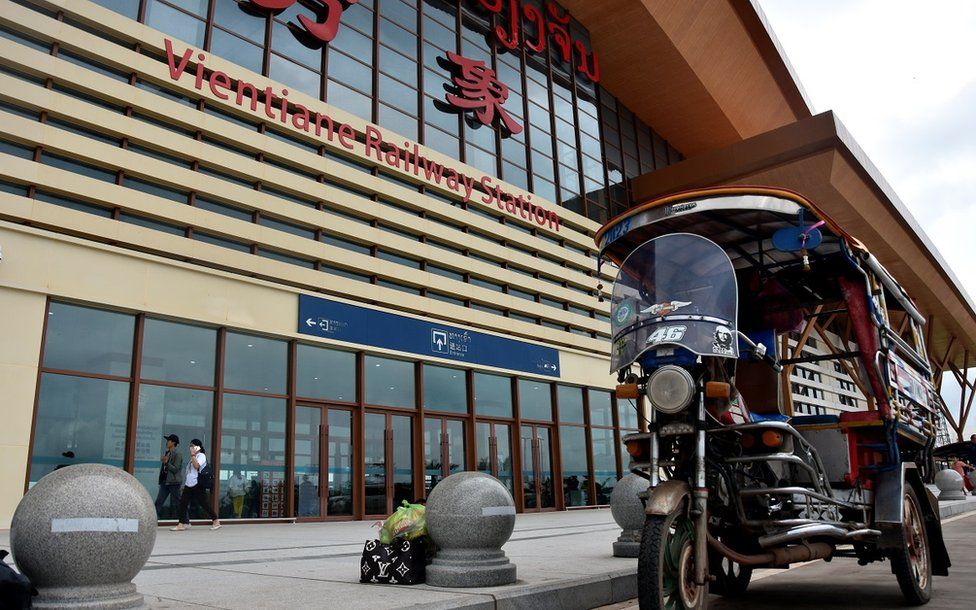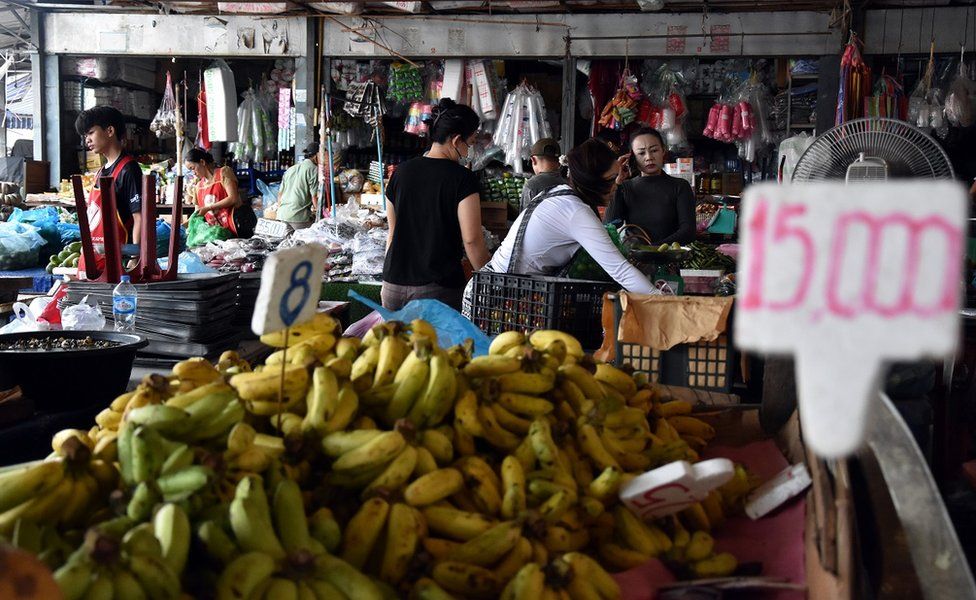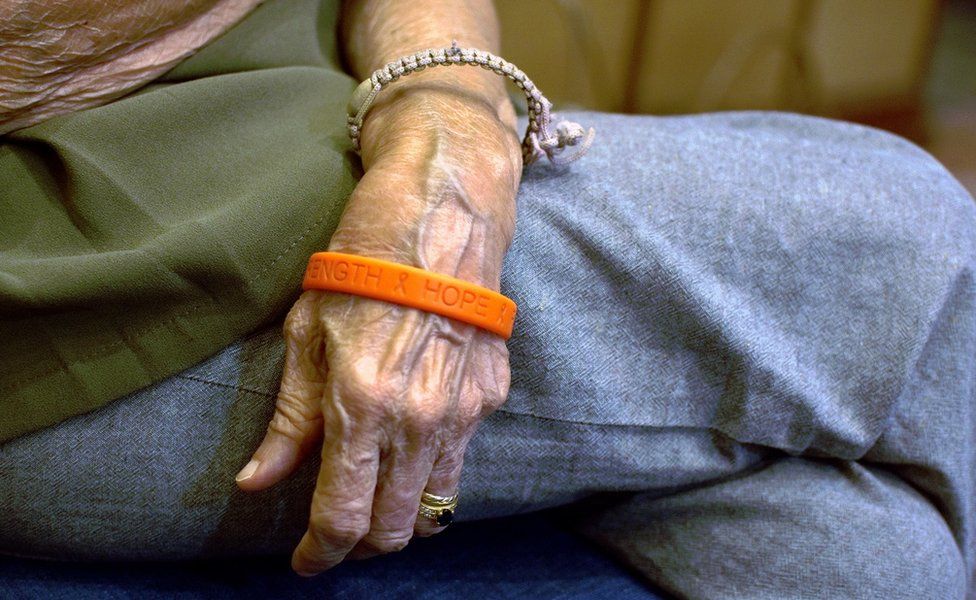Jo is the holder of a newly minted degree in English literature from one of the top universities in Laos. But the 22-year-old, who graduated only weeks ago, says he already feels “hopeless”.
Confronted with a barren job market, the Vientiane resident holds no hope of finding work at home, and instead aims to become a cleaner or a fruit picker in Australia. His aspirations are low, but they reflect a hushed disenchantment spreading among his peers; the result of a severe and sustained economic downturn that has ravaged Laos for the past two years.
“Every person in this generation doesn’t believe in the government. They want to leave Laos, they don’t believe anything the government says,” he tells the BBC. “Most of my friends have the same thoughts, but we only talk about it privately. If you say bad things about them in public, I don’t know what will happen.”
The economic crisis has been caused by a rash programme of government borrowing used to finance Chinese-backed infrastructure projects which has begun to unravel. The crisis shows little sign of easing, with public debt spiralling to unsustainable levels, resulting in government budget cuts, sky-high inflation and record-breaking currency depreciation, leaving many living on the brink in one of South East Asia’s poorest countries.
Faced with a dire economic situation, and with the April shooting of activist Anousa “Jack” Luangsuphom underscoring the brutal lengths authorities in the one-party state will go to silence calls for reform, a generation of young Laotians increasingly see their future abroad.
“[Young people] aren’t even thinking about change, it’s a feeling of how am I going to get out of this country – I’m stuck here, there’s no future for me,” said Emilie Pradichit, a Lao-French international human rights lawyer and the founder of human rights group Manushya Foundation.
“If you see your country becoming a colony of China, you see a government that is totally corrupt, and you cannot speak up because if you do you might be killed – would you want to stay?”
The ‘debt trap’
A sparsely populated, landlocked country of 7.5 million people, Laos is one of the region’s poorest and least developed nations. In a bid to transform the largely agrarian society, the past decade has seen the government take on major infrastructure projects, mostly financed by historic ally and neighbour China – itself on a lending spree since 2013 as part of its global infrastructure investment programme, the Belt and Road initiative (BRI).
Laos has built dozens of foreign-financed dams to transform itself into the “battery of South East Asia” as a major exporter of electricity to the region. But oversupply has turned many dams unproductive, and the state electricity company sits in $5bn (£4.1bn) debt. Lacking funds, Laos handed a majority Chinese-owned company a 25-year concession to manage large parts of its power grid in 2021, including control over exports.
Also among the debt-laden megaprojects is the Lao-China railway, connecting Vientiane to southern China. It opened in December 2021 at a cost of $5.9bn (£4.85bn), but saddled the Lao government with $1.9bn in debt. Beijing says the railway has created an “economic corridor”, but the numbers just don’t add up for some economists, not least because Chinese state-owned companies hold a 70% stake.

“I’m sure people are happy to travel very quickly across Laos, but it’s not justified at the cost that was agreed to,” economist Jayant Menon, a senior fellow at ISEAS-Yusof Ishak Institute in Singapore, says of the railway.
All of this has added to Laos’ ballooning debt, which is now ninth highest globally as a share of its GDP, according to the International Monetary Fund. Around half of that is owed to China, and Laos is now having to borrow more from lenders in the country just to stay afloat.
“Laos is so heavily indebted to China that their negotiating position is compromised,” he said. “It’s having to borrow just to service the debt. That’s the definition of a debt trap.”
The Lao government could not be reached for comment. But Mr Menon emphasised that Laos has repeatedly rejected other international lenders in favour of Beijing, perhaps because of a belief within the government that China “will not let another socialist country fail”. He added that Beijing was also cautious about letting another BRI country default on its debt after Sri Lanka.

This is the second in a series of stories that examines Chinese investment abroad 10 years after Xi Jinping launched the Belt and Road Initiative.
Read the first story about the shadowy Chinese firms that own chunks of Cambodia here.

The only thing currently preventing that outcome are repeated Chinese debt deferment agreements – the conditions of which remain highly opaque. This has raised concerns over Beijing’s growing sway over Laos. When asked if Laos is at risk of becoming a vassal state, Mr Menon said “that ship has sailed”.
He said that the “macro-instability” caused by “massive debt accumulation” has also caused the decline of the Lao currency, the kip, which continues to depreciate to record lows against the US dollar. This has led to a decades-high rise in prices, and nowhere is this being felt more acutely than among ordinary Laotians.
‘If I don’t fight, I’ll die’
“‘I have never experienced anything like this year,” says Phonxay, a frail looking woman in her 60s, selling household staples at a food market in Vientiane. She said her customers are buying less because “prices go up day to day”, adding that August was the most expensive month yet. Her family has had to adapt to survive.
“My family needs to eat more cheaply than ever before. We eat half of what we used to eat,” Phonxay says. “But I’ll fight until the end. If I don’t, I’ll die.”

But it’s young Lao, their futures mortgaged off for the benefit of infrastructure projects offering them few tangible opportunities, that will bear the brunt of the economic crisis for years to come.
“Lao is very good to travel, but not good to live in,” says Sen, a 19-year-old working as a receptionist in a hotel in Luang Prabang in northern Laos.
The city is bustling once again, with its Unesco World Heritage Old Quarter of pristine French colonial-era buildings filled with tourists. But Sen says times remain tough: “For normal people like me it’s very hard. It’s just better than living as a homeless person in India, and maybe just better than North Korea. I’m serious, we’re just trying to survive.”
He earns just $125 per month at his hotel job, but he doesn’t see any point in going to university or applying for government jobs as he’d have to “pay lots of money” to corrupt officials to get anywhere as he has no family connections.
“At the moment, almost every Lao student like myself doesn’t want to go to university,” he says. “They study Japanese or Korean and then apply to work in factories or farming in those countries.”
It’s this “sense of discouragement among Lao youth… that needs urgent attention,” says Catherine Phuong, the deputy resident representative at the UN Development Programme in Laos. She pointed to the “staggering” NEET (not in education, employment or training) rate of 38.7% among 18-to-24-year olds – by far the highest in South East Asia.
“We’re especially concerned in Laos that with the debt situation we are seeing reduced investment in the social sector, including health and education,” she told the BBC. “I’m sure you can imagine the impact that will have on this generation, not just in the coming years, but in the next 10 to 20 years.”
But with the Lao People’s Revolutionary Party, which has ruled the country since 1975, intolerant of dissenting voices, young people have had to turn to social media to air their grievances.
It was in March 2022, as inflation and the cost of living began rising, that Anousa “Jack” Luangsuphom created Kub Kluen Duay Keyboard or “The Power of the Keyboard”, one of a growing number of social commentary Facebook pages critical of authorities.
The 25-year-old was drawing tens of thousands of followers when he was attacked at a cafe in Vientiane on April 29. CCTV footage shows a masked man firing a bullet into Jack’s face and chest. A police statement days later blamed a business dispute or lover’s quarrel. Jack survived the attack, but for his followers, the culprit was obvious.
“I feel really bad that the government would shoot him, that they would try to control us like that,” says Jo, the university student in Vientiane, who follows Jack’s Facebook page. “Jack is the voice of Lao people, he said things that normal people are afraid to say.”

But these calls for reform will only be ignored or suppressed, and few know this better than Shui-Meng Ng – the wife of disappeared Lao civil society advocate Sombath Somphone.
Sombath has not been seen since being detained by police in Vientiane in December 2012, a time when his influence was growing and there was hope of reform.
Speaking to the BBC from her craft shop in downtown Vientiane, the last place she saw her husband the day he was abducted, Shui-Meng said voices like Jack’s and Sombath’s are squashed because they grow “too big a following” at times when the “Lao political elite are facing difficulties”.
“Every time something like [Jack’s shooting] happens, you see this,” she said, zipping her lips. “People go silent.”
Source : BBC















